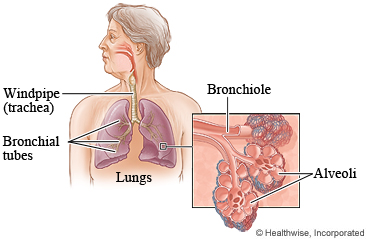Chronic Obstructive Pulmonary Disease (COPD) Flare-Ups: Care Instructions

Overview
Chronic obstructive pulmonary disease (COPD) is a lung disease that makes it hard to breathe. It is caused by damage to the lungs over many years, usually from smoking.
Chronic bronchitis and emphysema are two lung problems that are types of COPD:
- Chronic bronchitis: The airways that carry air to the lungs (bronchial tubes) get inflamed and make a lot of mucus. This can narrow or block the airways. It can also make you cough.
- Emphysema: The tiny air sacs (alveoli) at the end of the airways in the lungs are damaged. When the air sacs are damaged or destroyed, the inner walls break down, and the sacs become larger. These larger air sacs move less oxygen into the blood. This causes difficulty breathing or shortness of breath that gets worse over time. After air sacs are destroyed, they cannot be replaced.
Many people with COPD have attacks called flare-ups or exacerbations. This is when your usual symptoms quickly get worse and stay worse.
If you notice any problems or new symptoms, get medical treatment right away.
Follow-up care is a key part of your treatment and safety. Be sure to make and go to all appointments, and call your doctor or nurse advice line (811 in most provinces and territories) if you are having problems. It's also a good idea to know your test results and keep a list of the medicines you take.
How can you care for yourself at home?
- Be safe with medicines. Take your medicines exactly as prescribed. Call your doctor or nurse advice line if you think you are having a problem with your medicine. You may be taking medicines such as:
- Bronchodilators. These help open your airways and make breathing easier.
- Corticosteroids. These reduce airway inflammation. They may be given as pills, in a vein, or in an inhaled form. You may go home with pills in addition to an inhaler that you already use.
- A spacer may help you get more inhaled medicine to your lungs. Ask your doctor or pharmacist if a spacer is right for you. If it is, ask how to use it properly.
- If your doctor prescribed antibiotics, take them as directed. Do not stop taking them just because you feel better. You need to take the full course of antibiotics.
- If your doctor prescribed oxygen, use the flow rate your doctor has recommended. Do not change it without talking to your doctor first.
- Do not smoke. Smoking makes COPD worse. If you need help quitting, talk to your doctor about stop-smoking programs and medicines. These can increase your chances of quitting for good.
When should you call for help?
Call 911 anytime you think you may need emergency care. For example, call if:
- You have severe trouble breathing.
- You have severe chest pain, or chest pain is quickly getting worse.
Call your doctor or nurse advice line now or seek immediate medical care if:
- You have new or worse trouble breathing.
- Your coughing or wheezing gets worse.
- You cough up dark brown or bloody mucus (sputum).
- You have a new or higher fever.
Watch closely for changes in your health, and be sure to contact your doctor or nurse advice line if:
- You notice more mucus or a change in the colour of your mucus.
- You need to use your antibiotic or steroid pills.
- You do not get better as expected.
Where can you learn more?
Go to https://www.healthwise.net/patientEd
Enter D989 in the search box to learn more about "Chronic Obstructive Pulmonary Disease (COPD) Flare-Ups: Care Instructions".
Current as of: July 31, 2024
